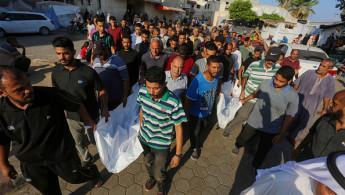On International Youth Day, young Palestinians in Gaza struggle with death and lost dreams
As the world marked International Youth Day yesterday, young Palestinians in the besieged Gaza Strip continue to struggle to survive a genocidal war by Israel that passed its tenth month.
Since October 2023, Israel launched a massive war on the besieged coastal enclave, which killed so far more than 39,800 Palestinians and injured more than 92,152, most of whom are women and children, according to the Palestinian Health Ministry in Gaza.
Out of the total number of Palestinian victims, around 24 per cent are categorised as "youth", including males and females, said the Ramallah-based Palestinian Central Bureau of Statistics (PCBS).
"It seems that the Israeli army is deliberately targeting young people and children in Gaza," the PCBS said in a report issued on Saturday, 10 August.
As a result of these Israeli attacks, demographics will be impacted with expectations that there will be a decrease in the number of births in the coming years, the PCBS warned.
Land of no hope
Rawan al-Jarou, from Gaza City, is unable to continue her university education due to Israel's war. The 23-year-old medical student was supposed to graduate from the university in 2025. But now, her dream has been dashed, as she said to The New Arab.
"I studied hard during the different stages of my education to achieve my dream and my father's dream of becoming a paediatrician," she added. Rawan's parents and two of her siblings were killed in an Israeli bombing that targeted their home in Gaza City in February 2024.
Despite losing her parents, her home, and her education, the young woman insists on fighting to survive and achieving her father's dream one day, no matter the cost.
For his part, Khalil Abu Samra's only chance to become a football player in one of the Palestinian clubs in the Gaza Strip vanished last month. His legs were amputated due to injuries sustained from an Israeli bombing hitting tents in supposedly an Israeli-designated 'safe zone' in Khan Younis in the southern Gaza Strip.
Before the war, the 19-year-old soccer played in the Khan Younis club.
"I won many silver and bronze medals in local competitions held in the Strip," he remarked to TNA.
Khalil was unable to bring his medals with him as he and his family escaped.
"My feet are my capital in this life. I dreamed of competing with Arab and European teams, but now I am confined to a wheelchair," he whispered.
Hadi Wadi lost his wife, four children, and house in subsequent Israeli attacks. Before the war, the 38-year-old lived a seemingly perfect life with his small family in Tal al-Hawa neighbourhood in Gaza City.
"I worked for many years to build a life that I dreamed a lot of it. My kids were smart children and my wife was a great woman," he remarked.
"I lost all of them and now lost any desire to live. I do not know why Israel still keeps me alive, I want to join my family in paradise," he said to TNA.
Psychological Trauma
The majority of Palestinians in the Gaza Strip have lost the desire to live despite their constant attempts to escape death, Walid al-Hindi, a Gaza-based psychologist, told TNA.
"This is a natural result of the tragic circumstances that Palestinians have been living for months," he added.
Moreover, the war will leave scars that will last for decades, according to al-Hindi. "After the war, all the Gazans need psychological treatment to rebuild themselves as human beings and restore their desire to live so that they can rebuild their homes, their city and their lives," he stressed.
None of the international and Palestinian organisations are able to estimate the extent of mental health crises among Palestinians in Gaza today due to the war.
However, the World Health Organisation found in previous studies that at least 10 per cent of those exposed to traumatic events in armed conflict will suffer from serious mental health problems.
Meanwhile, the WHO said that another 10 per cent of the victims "will develop behaviour that will impede their ability to function effectively. The most common conditions are anxiety, depression and psychosomatic problems including insomnia, back pain and stomach pain."
According to the UN, International Youth Day is meant as an opportunity for governments and others to draw attention to youth issues worldwide.
Clearly for Palestinian youths in Gaza—who are the future of Palestine—tomorrow remains grim, as long as Israel continues to unleash widespread, brutal violence with legal, political and economic impunity.





 Follow the Middle East's top stories in English at The New Arab on Google News
Follow the Middle East's top stories in English at The New Arab on Google News


